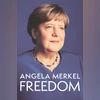FREEDOM: Memoirs 1954-2021
Author: Angela Merkel with Beate Baumann
Publisher: St. Martin’s
Pages: 709
Price: $40
“Never explain, never complain,” is a maxim supposedly espoused by the British royal family. As Angela Merkel writes in her exhaustive yet surprisingly fast-paced autobiography, Freedom, it also became a phrase that she would repeat to herself during her 16 years as German chancellor, from 2005 until she stepped down in December 2021.More From This Section
Readers of Freedom might be surprised that Merkel brings up this English dictum not in a discussion of the consequences of a fraught policy decision, though there are many in this 709-page book, but in response to the bullying micro-aggressions of the Russian president Vladimir V Putin, who on one occasion in 2007 brought his Labrador to a press-filled meeting with Merkel, even after his staff was told that the chancellor had a phobia of dogs. “Stay calm, focus on the photographers, it won’t be for long,” she recalls telling herself.
The episode also serves as an unintended parable, perhaps, of the way Merkel’s staid disposition, cultivated through her political coming-of-age in Germany’s buoyant 1990s, seemed more and more ineffectual as Putin and other illiberal leaders proliferated across the continent.
Despite her favourite motto, Freedom does offer something like an explanation of the countless decisions that Merkel made in response to the series of crises that hit Germany during her long stay in office. Yet, in the three years since, Germany’s reliance on increasingly authoritarian countries—Russia for energy, China as a trading partner—and, in a different but, especially now, worrisome sense, on the United States for defence, has left the nation in a vulnerable position.
Germans have begun to re-examine the Merkel era with a much more critical eye, and the formerly quiet chancellor has felt compelled to speak—re-emerg–ing, after a long period of relative silence, in the pages of Freedom with the help of Beate Baumann, her co-author. For the English edition of Freedom, Merkel, ever the consensus builder, has also employed no fewer than eight translators, who somehow manage not to get in one another’s way as they present the German leader’s innermost thoughts and feelings.
Merkel would have every reason to hope for a victory lap. Despite finishing her tenure in the middle of a pandemic, she left Germany with a recovering GDP and a sense that she had weathered a turbulent era with relative fortitude. Her political ascent was also anything but inevitable, and in Freedom she rightfully emphasises the many difficulties she encountered as a woman from East Germany. For two decades, she led the centre-right Christian Democratic Union (CDU), which was traditionally dominated by men from the West.
On the other hand, it’s also true that Merkel’s origins were partly responsible for her astounding political success. She represented, and became, a kind of big-tent figure to many Germans, encapsulating so much of the experience of living in a fractured country. Born in 1954 in West Germany to a Protestant pastor who decided to take a position at a church in what had become East Germany,
Merkel devotes a long section of her book to the rapid and unexpected events that followed November 1989. The fall of the Berlin Wall presented her, at 35, with a new life. “I expected many things,” she once said, “but not the gift of freedom before I reached retirement age.”
She became a deputy spokeswoman for the German government in 1990 and ascended quickly through a series of ministerial postings. Along the way she felled many of her male rivals and even some allies. In 1999, after a donation scandal, she published a legendary letter in the Frankfurter Allgemeine Zeitung that helped force her former mentor, the CDU chancellor Helmut Kohl, who reunited Germany, to step down. The move cleared her path to party leadership in 2000 and earned her a reputation as a brilliant but brutal political assassin. She became chancellor when her coalition won a majority in 2005.
The controversy that Merkel credits most for motivating her to write a memoir is what she calls the “caesura in my chancellorship”—her decision in September 2015 to allow open passage into Germany for refugees fleeing mainly from Syria (Germany would register 1.1. million arrivals that year). Merkel reflects with special anguish on the famous phrase she uttered: “We can do this!” She is bewildered that this was misconstrued to mean that Germany would welcome all the world’s refugees. “If, at that time, someone had told me that ‘We can do this’—those four commonplace words—would be used to reproach me for weeks, months and years to come,” Merkel writes, “I would have looked at them in disbelief and said: I beg your pardon?”
In regional elections earlier this year, the political fallout from further migrant crises and Germany’s fragile economy lifted the fortunes of the far right, especially in the country's former East. Still, in Freedom, Merkel reaffirms her liberal ideal that moderation is a “precondition for the success of democratic parties.” She also conveys an unwavering commitment to the convictions by which she governed: the universality and inviolability of individual human dignity, and the boon of an open, interconnected world, built on shared prosperity. She may very well be right in her convictions; and yet being right might come as small solace to the millions of Germans facing the future with a deep sense of distress and not looking, as she writes toward the end, for “joy in our hearts” and “lightness of spirit.”
The reviewer is a contributing writer for The Times Magazine and has reported extensively on European and American politics.

)